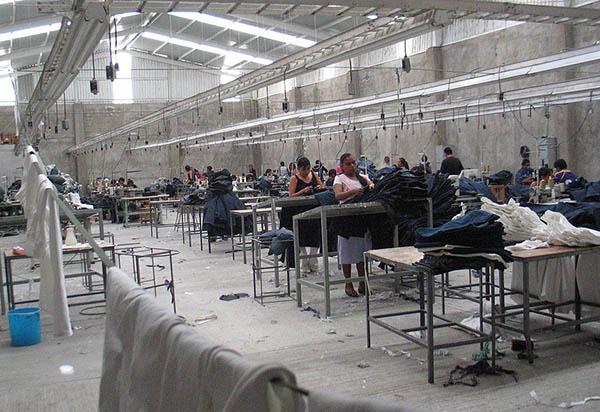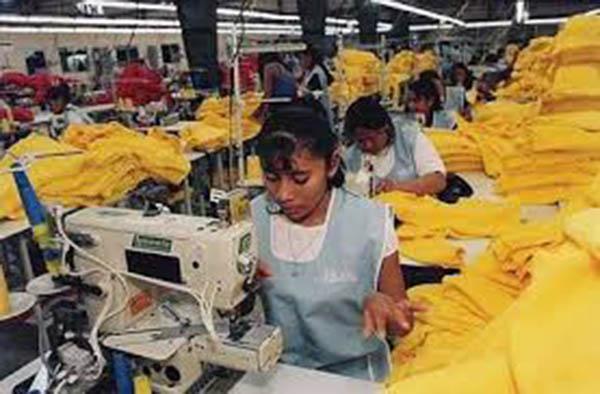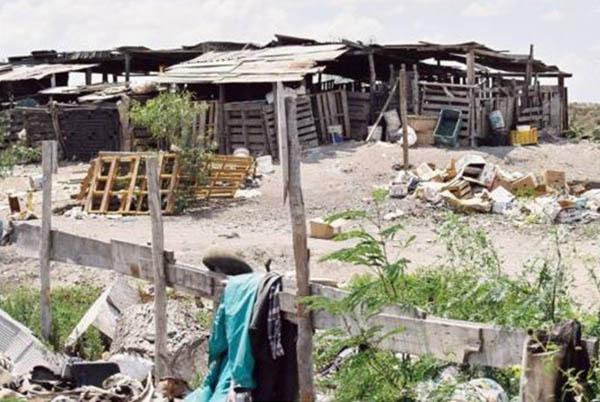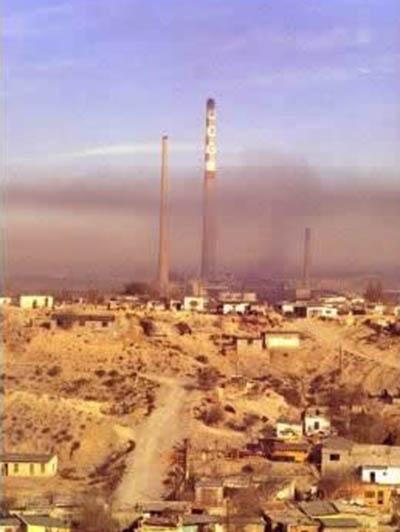Bob Avakian has written that one of three things that has “to happen in order for there to be real and lasting change for the better: People have to fully confront the actual history of this country and its role in the world up to today, and the terrible consequences of this.” (See “3 Things that have to happen in order for there to be real and lasting change for the better.”)
In that light, and in that spirit, “American Crime” is a regular feature of revcom.us. Each installment focuses on one of the 100 worst crimes committed by the U.S. rulers—out of countless bloody crimes they have carried out against people around the world, from the founding of the U.S. to the present day.
See all the articles in this series.


By 1998 there were more than a million workers in 3,700 factories assembling electronics, clothing, toys, auto parts, and other products for sale in the U.S. As many as 75% of those hired in the maquiladoras were women, the majority 16 to 23 years old. (Photo: AP)
The Crime
The “free trade” agreement between the U.S., Canada, and Mexico, known as NAFTA (North American Free Trade Agreement), was implemented in 1994 with much fanfare. The secretly negotiated 2,000-page treaty was touted as a measure to bring increased prosperity to the people of the three countries. NAFTA was, in fact, a predatory treaty whose effect was to ratchet up the cruel and reckless plunder of Mexico and its people. This mainly occurred through the rapid expansion of low-wage border “sweatshops” called maquiladoras. U.S. businesses have reaped enormous profits from hundreds of thousands of low-wage Mexican workers.
NAFTA was designed to allow the U.S. corporations to intensify their exploitation of Mexico and Mexicans. For example, NAFTA removed tariffs on goods crossing the U.S.-Mexico border. This greatly benefited the highly mechanized U.S. corporate agricultural businesses. NAFTA eliminated all taxes for goods, like electronics, brought into Mexico to be assembled and returned to the U.S. In the first year of NAFTA, nearly $100 billion of new direct foreign investment gushed into Mexico.
In the process, millions of Mexico’s small farmers and Mexican-owned businesses were unable to survive. Unemployment rose and wages for Mexican workers, already low, were driven further down. Mexicans from across the country, desperate for work, flocked to border cities like Juárez, Tijuana, and Nuevo Laredo to work in factories owned by corporations like General Motors, General Electric, Zenith, AT&T, and many others.
NAFTA provided the economic basis for non-Mexican companies, the majority of which are U.S.-based, to expand their operations or open new ones. Many were anxious to take advantage of the favorable “profit environment” in Mexico where wages were 12 times lower than those paid for the same work on the U.S. side of the border! By1998, there were more than a million workers in 3,700 factories assembling electronics, clothing, toys, auto parts, and other products for sale in the U.S.


The factory owners hired young women for their dexterity and youthful energy. But they were also preferred because, in societies (on both sides of the border) dominated by patriarchy and misogyny, women are more exploitable—could be put to work for long, exhausting hours, often with no breaks and very short lunch periods with pay lower than their male counterparts.
As many as 75 percent of those hired in the maquiladoras were women, the majority between the ages of 16 and 23. Many were recent arrivals from rural villages and towns. The factory owners hired young women for their dexterity and youthful energy. But they were also preferred because, in societies (on both sides of the border) dominated by patriarchy and misogyny, women are more exploitable—could be put to work for long, exhausting hours, often with no breaks and very short lunch periods with pay lower than their male counterparts. As women, they are regarded as “supplementary income-earners.”
Ciudad Juárez is one of the largest concentrations of maquila factories. One-third of women working in Juárez apparel factories are heads of households. While women workers are vulnerable to manipulation by men in positions of authority, single mothers are especially so because their livelihoods and the well-being of their children are at stake. Mothers and parents rely on working extra shifts or overtime to earn enough. Factory supervisors are known to use this necessity as blackmail. For example, workers from one company complained that supervisors demanded a bribe of 50 pesos a week in order to be eligible for overtime. Workers who protested this kind of humiliating treatment were punished by being sent to a special work area known to the workers as “the prison,” or simply, “hell.”


Many maquiladora workers live in communities of makeshift homes of cardboard, castoff pallets or packing crates from factories, in shantytowns without indoor plumbing, electricity, or public lighting. Some make homes next to trash dumps. Their homes are frequently poorly insulated and dangerous. (Photos: MtHolyoke.edu)
Many maquiladora workers live in communities of makeshift homes of cardboard, cast off pallets, or packing crates from factories, or in shantytowns without indoor plumbing, electricity, or public lighting. Some make homes next to trash dumps. Their homes are frequently poorly insulated and dangerous. In winter especially, parents worry that children at home alone with a heater for warmth risk fire in their highly flammable structures. There is also the constant problem of food insecurity. Maquila wages are actually below the threshold of survival. A line operator, for example, as of 2015, made 650 pesos, $39 a week, in a place where food costs rival those on the U.S. side of the border. This forces working families into a constant struggle to provide for food and other necessities.
Workers in the maquiladoras are made to work around dust and chemicals that ruin their health, and have been known to cause birth defects. A study conducted in 1994 was the first to show that maquiladora workers gave birth to more lower-weight babies than women who worked in other industries. Their living places are often located near factories where environmental conditions are dangerous. Border residents are often exposed to extremely high air-pollutant levels, including high levels of carbon monoxide. Deteriorating water quality is another concern along the border. The promises made that provisions in NAFTA would guarantee protections for the environment have proven worthless. They have seen gradual deterioration in the urban communities where the factories are located as a result of the toxic waste from the maquiladoras.


In the urban communities where the factories are located, there has been environmental deterioration such as this cloud of brown smog covering Ciudad Juarez (above), and contamination of the water supply as a result of the toxic waste from the maquiladoras such as this lake which has lead levels more than 3,000 times higher than U.S. Standards (below). (Photos: MtHolyoke.edu)

Many companies subject women hires to humiliating pregnancy tests as a condition of employment. And women employees are warned that getting pregnant could cost them their jobs. Human Rights Watch documented cases of maquiladora personnel forcing pregnant workers to work unpaid overtime, assigning them more physically difficult work, or refusing them overtime in an effort to force them to quit.
Meanwhile, stories of predatory managers and supervisors using their power to extract sexual favors in exchange for a job or job security are widespread. Failure to comply or efforts to report sexual harassment can mean the loss of a job, of needed overtime, or other punishments. For women and their families, these can be life-and-death issues.
Since 1993, according to Mexican authorities, as many as 1,500 women were murdered in the city of Juárez, next to the U.S./Mexico border. The bodies of many hundreds of these women have been found in the desert area around the maquiladoras. Many were attacked while traveling in dangerous conditions to and from work. Others, it seems, were killed somewhere else—then dumped in the desert. A great many had been raped, beaten, and mutilated before being murdered.
Maquiladora companies have done little in response to the killings. The vast majority—some estimates say 98 percent—of these murders go unsolved. One relative of a victim said, “There’s an element that the women are not worth the trouble.... There’s an incredible disregard for poor, brown women. There’s a racist attitude and a classist attitude.” The mother of a “disappeared” woman said, “We’ve opened the big door, our border to the U.S., in order to allow big multinationals to settle in our city. We give them a permit to do absolutely anything. They don’t have to guarantee the most elementary aspects of life, from wages women can live on to basic service in our communities, or even just security.”
There are a lot of contributing factors to these murders. The shocking rise of these murders coincided with the burgeoning maquiladoras—with poor women migrating to the border from all over Mexico in search of a job—working long hours, dangerously traveling at dawn and leaving work after dark. Janette Terrazas, a visual artist and activist put it, “The maquiladoras created violent public spaces.” Also, the stresses and social conditions of the maquila factories has contributed to marriage conflict, child abuse, and domestic violence against women. Women leaving home to work in the maquiladoras challenges the “tradition” of women’s subordination to husband and “domestic duties”—adding to a situation where more than four out of 10 women say they have suffered domestic violence.

Imperialism means huge monopolies and financial institutions controlling the economies and the political systems—and the lives of people—not just in one country but all over the world. Imperialism means parasitic exploiters who oppress hundreds of millions of people and condemn them to untold misery; parasitic financiers who can cause millions to starve just by pressing a computer key and thereby shifting vast amounts of wealth from one place to another. Imperialism means war—war to put down the resistance and rebellion of the oppressed, and war between rival imperialist states—it means the leaders of these states can condemn humanity to unbelievable devastation, perhaps even total annihilation, with the push of a button.
Imperialism is capitalism at the stage where its basic contradictions have been raised to tremendously explosive levels. But imperialism also means that there will be revolution—the oppressed rising up to overthrow their exploiters and tormentors—and that this revolution will be a worldwide struggle to sweep away the global monster, imperialism.
—Bob Avakian, BAsics 1:6
The Criminals:
U.S. President George H.W. Bush (1988-92): NAFTA was preceded by a bilateral treaty between the U.S. and Canada. Negotiations to expand that treaty to include Mexico began under the U.S. administration of George H.W. Bush.
Mexico President Carlos Salinas de Gortari: Presided over Mexico’s NAFTA negotiations. Salinas oversaw the privatization of Mexico’s telephone company and banks among a thousand other public entities. Some were sold at fire-sale prices to personal friends, and to foreign, especially U.S., companies. Salinas promoted NAFTA with the help of powerful Mexican business interests, claiming it would lift Mexico into the ranks of prosperous “first world” countries. But as his term ended in 1994, Mexico’s economy crashed and Salinas fled into exile.
U.S. President Bill Clinton (1992-2000): Pushed through ratification of NAFTA with the help of the U.S. Business Roundtable and other corporate backers. Clinton claimed that the treaty would lift people in all countries.
The Alibi:
NAFTA proponents promised that the trade agreement would alleviate many of the problems along the border caused by the existing free-trade zone. NAFTA, it was said, would help to improve working conditions, improve enforcement of environmental laws, and decrease the high maquiladora concentration along the border.
U.S. President George H.W. Bush made clear his support for more free-trade pacts and linked the expansion of markets for American entrepreneurs and farmers with greater freedom throughout the world. He argued that more free trade between countries, regardless of the size and wealth disparities between trading partners, would lead to the expansion of civil and political freedom.
President Clinton said his support of the trade agreement rested on his confidence it would bring jobs and prosperity to all.
The Real Motive:
In the 1970s, U.S. corporations began moving their factories to low-wage countries to bolster profits and competitiveness. By 1994, U.S.-based transnational corporations (TNCs) employed 40 percent of their personnel in oppressed (or “Third World”) nations and conducted a third of their internal trade with affiliates in those nations.
Maquiladoras were first set up in the mid-1960s to take advantage of low-wage labor within easy access of the U.S. border. These borderland factories became a rich haven for U.S. and other foreign investors. Profits from these enterprises grew in importance for U.S. businesses in an increasingly competitive world.
Maquiladora factories became islands of modernity, enclaves of globalized economy distorting Mexico’s economic development and putting increasing control of the economy in non-Mexican hands.
The accelerated capitalist global competition that followed the collapse of the Soviet Union, and the rise of a more economically robust capitalist China, spurred U.S. moves towards even greater exploitation of people and countries. It renewed interest in Mexico, which, since 1848 has been a major source of wealth for U.S. capitalism. Mexico’s dependent economy and its “comprador” ruling elite allowed an open door for U.S. corporations to ramp up their penetration of Mexico’s economy.The U.S. had long benefited from Mexican workers and the exploitation of Mexico and Mexicans, which has provided sustenance to an expanding empire. Thus NAFTA and the maquiladora system is both a continuation and intensification of the long history of the U.S. accumulating wealth from the plunder of its southern neighbor and a counterweight to the growing economic strength of the European Union, Japan, China, and other competitive countries.
Sources:
James Cockcroft, Mexico’s Hope, Monthly Review Press, 1998
“Mexico’s Maquiladoras: Abuses Against Women Workers,” Human Rights Watch, August 17, 1996
Patricia Fernandez Kelly, “The ‘Maquila’ Women”, NACLA Report
Sierra Jorgensen, “Maquiladoras and the Exploitation of Women’s Bodies”
David Bacon, “The Maquiladora Workers of Juárez Find Their Voice,” Nation magazine, November 20, 2015
Elyse Bolterstein, “Environmental Justice Case Study: Maquiladora Workers and Border Issues”
Gil Villagrán, “Maquiladoras, NAFTA’s Sweatshops,” May 2, 2009
“Mexico: Wages, Maquiladoras, NAFTA,” Migration News, February 1998
Evelyn Nieves, To Work and Die in Juárez, Mother Jones, May/June 2002
Jessica Livingston, “Murder in Juárez: Gender, Sexual Violence, and the Global Assembly Line,” Frontiers: A Journal of Women Studies, Volume 25, Number 1, 2004
Alana Semuels, “Upheaval in the Factories of Juárez,” Atlantic magazine, January 21, 2016
